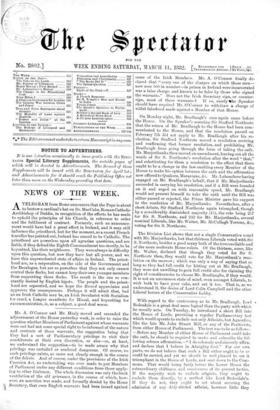On Monday night, Mr. Bradlaugh's case again came before the
House. On the Speaker's assuring Sir Stafford Northcote that the return of Mr. Bradlaugh to the House bad been com- municated to the House, and that the resolution passed on February 7th did not apply to Mr. Bradlaugh after his re- election, Sir Stafford Northcote moved a resolution reviving and reaffirming that former resolution, and prohibiting Mr. Bradlaugh from going through the form of taking the oath. Mr. Marjoribanks then moved an amendment, leaving out all the words of Sir S. Northcote's resolution after the word " that," and substituting for them a resolution to the effect that there ought to be a change in the law enabling every Member of the House to make his option between the oath and the affirmation now offered to Quakers, Moravians, &c. Mr. Labouchere having engaged on Mr. Bradlaugh's behalf, that if Mr. Marjoribanks succeeded in carrying his resolution, and if a Bill were founded on it and urged on with reasonable speed, Mr. Bradlaugh would not present himself to take the oath until the Bill was either passed or rejected, the Prime Minister gave his support to the resolution of Mr. Marjoribanks. Nevertheless, after a short debate, Sir Stafford Northcote again triumphed, though by a considerably diminished majority (15), the vote being 257 for Sir S. Northcote, and 242 for Mr. Marjoribanks, several nominal Liberals, like Mr. Walter, Mr. McCullagh Torrens, &c., voting for Sir S. Northcote.


































